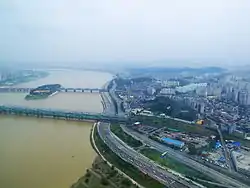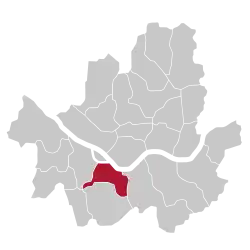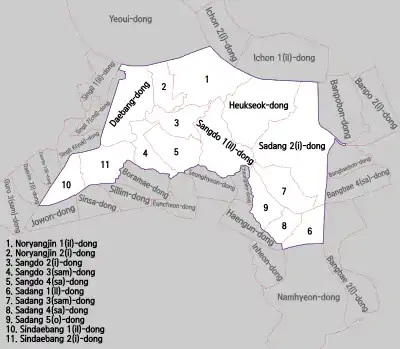Dongjak District
Dongjak District (Dongjak-gu) is one of the 25 gu that make up the city of Seoul, South Korea. Its name was derived from the Dongjaegi Naruteo Ferry, on the Han River which borders the district to the north. It was the 17th gu created in Seoul, after being separated from Gwanak District on April 1, 1980.[3]
Dongjak
동작구 | |
|---|---|
| 동작구 · 銅雀區 | |
 Views of Dongjak District | |
 Location of Dongjak-gu in Seoul | |
| Country | South Korea |
| Region | Sudogwon |
| Special City | Seoul |
| Administrative dong | 15[1] |
| Government | |
| • Mayor | Lee Chang-woo (Democratic) |
| • Council | Dongjak District Council |
| • Members of the Seoul Metropolitan Council | 최영수 (Democratic) 1st Electoral District 김혜련 (Democratic) 2nd Electoral District 박기열 (Democratic) 3rd Electoral District 유용 (Democratic) 4th Electoral District |
| • Members of the National Assembly | Kim Byung-kee (Democratic) Dongjak-gu Gap district Na Kyung-won (Liberty Korea) Dongjak-gu Eul district |
| Area | |
| • Total | 16.35 km2 (6.31 sq mi) |
| Population (2010[2]) | |
| • Total | 397,317 |
| • Density | 24,000/km2 (63,000/sq mi) |
| Time zone | UTC+9 (Korea Standard Time) |
| Postal code. | 06900 ~ 07199 |
| Area code(s) | +82-2-500,800~ |
| Website | Dongjak-gu official website |
Symbols

The main symbol of Dongjak District is the snowy heron. A cartoon character named 'Roya', a baby snowy heron, can be seen on signs, banners, and even light poles throughout the gu. According to the official website, use of the snowy heron is meant to symbolize the "clean, beautiful and noble spirit" of Dongjak's people. The emblem, found at most official buildings, depicts the snowy heron soaring into the sky.
Economy
Dongjak is home to some KOSPI200 companies, including Nongshim, Honam Petrochemical, and Yuhan.
Administrative divisions

Dongjak District is divided into 15 dong:[1]
- Daebang-dong
- Heukseok-dong (all of this dong was combined in January 2008)
- Noryangjin-dong 1, 2 (Bon-dong was combined with Noryangjin 1-dong in September 2008)
- Sadang-dong 1, 2, 3, 4, 5 (Dongjak-dong was combined with Sadang 2-dong in September 2008)
- Sangdo-dong 1, 2, 3, 4 (2 and 5 dong were combined in January 2008)
- Sindaebang-dong 1, 2
Education
Dongjak District is home to Chongshin University, the Seoul campus of Chung-Ang University, and Soongsil University.
Noryangjin-dong, especially near Noryangjin Station is known for private institutes or Hagwons, for college admission test and civil service examinations.
Places of interest
There are many notable sights in Dongjak District. The most famous is the National Cemetery in Dongjak-dong. Additionally, several temples are in the ward. The Noryangjin Fish Market is notable: Almost half of the fish brought to the city comes through here.
Boramae Park is a large park that was used as an airfield during the Korean War. It now has several decommissioned aircraft on display. The park has a large jogging track, workout equipment, a rock climbing wall, skate park, basketball courts, badminton courts, tennis courts, playgrounds, and Boramae Buddhist Temple.
Transportation
Railways
- Seoul Subway Line 2 Circle Line
- (Seocho-gu) ← Sadang → (Gwanak-gu) ← Sindaebang → (Guro-gu)
- (Yongsan-gu) ← Dongjak — Isu — Sadang Station → (Seocho-gu)
- (Seocho-gu) ← Isu — Namseong — Soongsil University — Sangdo — Jangseungbaegi — Sindaebangsamgeori → (Yeongdeungpo-gu)
- Seoul Metro Line 9 Corporation
- (Yeongdeungpo-gu) ← Noryangjin — Nodeul — Heukseok — Dongjak → (Seocho-gu)
Sister cities
References
- "Administrative district - area". Dongjak-gu. Retrieved 2015-01-06.
- Korean Statistical Information Service (Korean) > Population and Household > Census Result (2010) > Population by Administrative district, Sex and Age / Alien by Administrative district and Sex Archived 2013-08-26 at the Wayback Machine, Retrieved 2010-06-02.
- "동작구 (Dongjak-gu 銅雀區)" (in Korean). Doosan Encyclopedia. Retrieved 2008-04-17.
- "International Exchange". List of Affiliation Partners within Prefectures. Council of Local Authorities for International Relations (CLAIR). Archived from the original on 24 December 2015. Retrieved 21 November 2015.
- "Sister Cities". Dongjak-gu. Retrieved 24 October 2019.
External links
| Wikimedia Commons has media related to Dongjak-gu, Seoul. |


